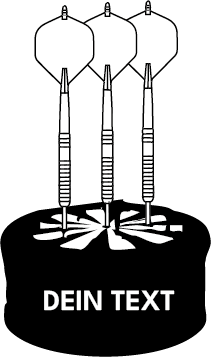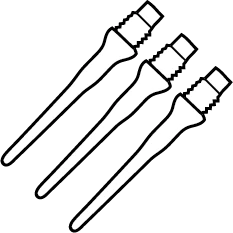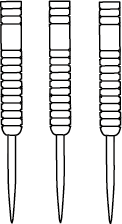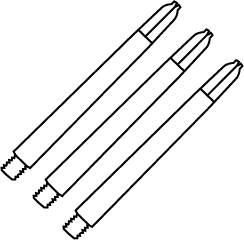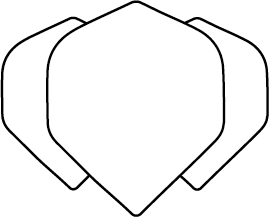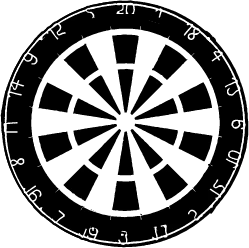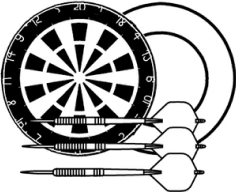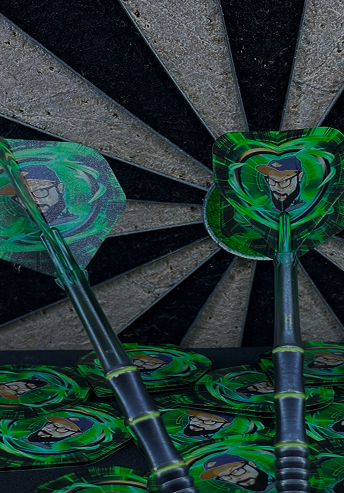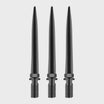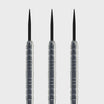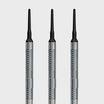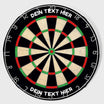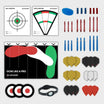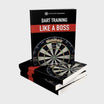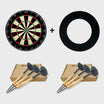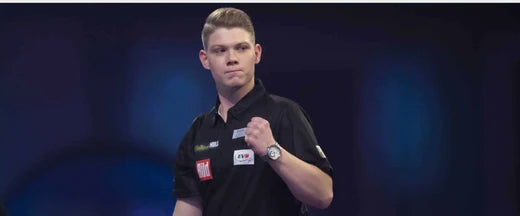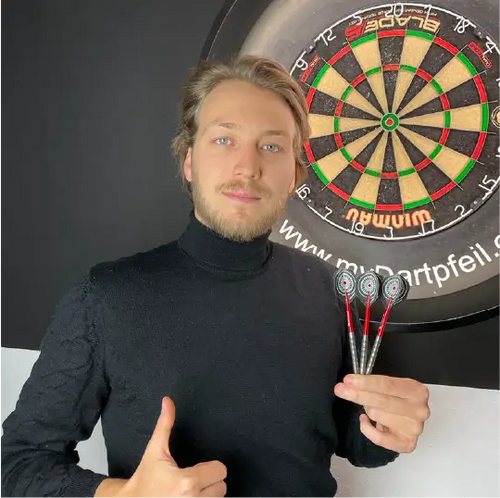Every darts fan has probably imagined what it would be like to earn a living as a professional darts player . Throwing a few darts every now and then and earning tens of thousands of euros .
However, the path to becoming a PDC professional isn't quite that simple. However, the basic principle remains: everyone has the opportunity to become a professional darts player . Therefore, it requires not only talent , but also hard work and a great deal of perseverance .
The perfect way to become a PDC darts professional
Especially in Germany, there are many talented players who are still undiscovered. Unlike the darts powerhouses of England and the Netherlands, however, Germany doesn't yet have a proper scouting system or anything similar.
For this reason, the Professional Darts Corporation (PDC) has ensured that players can create the opportunity for themselves to advance into the PDC even with small amounts of money.
For this purpose, the PDC launched the so-called Q-Schools . In January 2018, around 600 participants competed for a PDC Tour Card at the Q-Schools in Wigan and Hildesheim.

Registration for Q-School
Any darts player aged 16 and over can register for Q-School. British participants will compete in the tournament in Wigan. German players and those from many other European countries can participate in Q-School in Hildesheim.
This sounds very promising at first. However, the PDC must ensure that not too many players participate in Q-School whose talent is insufficient for the professional circuit.
For this, the PDC charges a one-time registration fee of 400 pounds . An additional 50 pounds is due for the DRA (Darts Regulation Authority). Or, more simply, for the PDC's Arbitration Panel.
The reason for this is that this amount deters players whose level is not yet sufficient . Furthermore, the professional association is trying to set the entry fee of around £450 so that all talented players can participate in Q-School.
Daily winners and finalists receive PDC Tourcard
Anyone has the opportunity to become a professional darts player. Therefore, it requires not only talent , but also hard work and a great deal of perseverance .
The path to the PDC is fiercely competitive, and of course, not everyone becomes a darts professional. The European Q-School in Hildesheim takes place once a year, over four days .
Only the four winners of these days will receive a tour card . The remaining tour cards will be awarded according to the so-called "Qualifying School Order of Merit."
If you've ever thought about getting one of the coveted tour cards, you'll realize at this point that it will require more than just talent.
With such a tour card, it's possible to play in the PDC's major tournament series and make a name for yourself among the renowned professionals. The Players Championship events are particularly worth mentioning here.
Important: The tour card is valid for two years !

Alternative routes to the PDC: Challenge and Development Tour
Two other ways to secure a PDC Tour Card are the PDC Challenge and Development Tours. The Challenge Tour has existed since 2013 and is for all darts players who failed to secure a tour card at Q-School .
This also includes BDO players who participated in Q-School and are suspended from the BDO for six months as a result. All members of the Professional Dart Players Association (PDPA) who do not hold a Tour Card are generally eligible to participate.
Infobox : Since 2018, however, you have to have participated in Q-School to qualify for the Challenge Tour.
The Challenge Tour has its own ranking system, the "Challenge Tour Order of Merit," in which the second- and first-place finishers each receive a PDC Pro Tour card. Those ranked third to eighth receive free entry to the next Q-School. The Challenge Tour hosts a total of 20 tournaments per year .
PDC Development Tour
In addition, the PDC Unicorn Youth Tour – now known as the PDC Development Tour – has been in existence since 2011. This tour is specifically designed for young players between 16 and 23 years of age .
The Development Tour also has its own ranking, the “Development Tour Order of Merit,” in which the second and first-place finishers also receive a Pro Tour card .
Here, too, players ranked 3rd to 8th are allowed to participate in the next Q-School free of charge. The total prize money paid out on the Development Tour has been £190,000 since 2016.
The four tournaments in Germany will be held in Hildesheim. There was also a new feature this year: tour winner Luke Humphries has been granted a direct spot in the PDC Darts World Championship as a professional darts player.
The PDC has also hosted the World Youth Championship since 2011. The best players on the Development Tour Order of Merit, along with other international qualifiers and players under the age of 23 , qualify for this event.
The winner of the Youth World Championship will be rewarded with a starting place in the PDC World Championship and will be allowed to play alongside the finalist in the following year's Grand Slam of Darts.

To what extent do sponsors play an important role for a professional darts player?
A sponsor is particularly important at the start of a tour, where the Q-School winners sometimes travel across Europe. Therefore, it's almost impossible to reach the PDC's top 64 without a reputable sponsor these days.
The top 64 finishers on the Order of Merit automatically receive a tour card for the following year. Thus, a top 64 finish is considered an important milestone on the path to becoming a professional darts player.
For this reason, major darts equipment manufacturers or betting providers often appear as sponsors . However, there are no limits to who you can ultimately be sponsored by.
Current example: The German software manufacturer SAP has been sponsoring professional darts player Rob “The Voltage” Cross since last year.
The pressure must be taken away by the sponsor
It's important that you don't feel any financial pressure during the two-year tour card period. A sponsor should, above all, relieve the player of this burden.
In addition, a sponsor also takes care of the perfect equipment . Only then can the player ultimately get a chance to become a professional darts player on the highly competitive professional circuit.
How much are the costs for travel and participation?
If you've managed to secure a sponsor , your path to the PDC is paved. However, it's important not to be blinded by the sometimes high prize money. There's a specific reason for this. Many players who aspire to become professional darts players underestimate the travel costs involved .
Flights, meals, and hotels are the largest costs players face during a tour. However, only the world's best receive sufficient financial support from a sponsor. Many players cover these expenses themselves, and are therefore constantly under pressure to earn money .
Then a simple calculation: A hotel for two nights, a flight within Europe and the cost of food can easily add up to €250 to €300 .
Of course, these not only have to be recouped , but also multiplied to generate a profit . Therefore, especially when it comes to prize money, it's important not to be blinded by the amount and to calculate accurately.
How much do professional darts players earn?
Overall, it's important to know how much a professional darts player earns. Or, to put it another way: how much do you need to earn to make a living from darts?
Roughly speaking, you can expect to earn £1,200 per month . This means you'd need to earn £14,400 per year on the Order of Merit to actually be able to make a living from darts.
Even then you will have to lower your standard of living enormously , because this is just the prize money .
Infobox: Costs for flights, accommodation and meals have not yet been deducted.
Anything much lower, and you'll probably have to juggle another part-time job . If you take a closer look at the PDC's Order of Merit, it becomes clear that it's necessary to be among the top 100 darts players in the world.
All players outside of this top 100 generally can't make a living from PDC tournaments – and it's a long way to the top 100. Of course, you can also see the best darts players regularly on TV.
If you would like to watch darts live on TV on a regular basis, you can secure your free trial month with DAZN !
Exhibitions for improvement
Nevertheless, there are other ways to supplement your pocket money. Most well-known players like to earn additional money through so-called exhibitions .
In this case, a darts professional is booked by private individuals, companies, or other organizers. In this case, the player shows up, plays against amateurs for an hour or two , engages in small talk , and then disappears again.
Infobox: It is not uncommon for professionals to earn a large portion of their total income this way.

Earnings of the top 10 in the last two years
The situation is, of course, quite different for the PDC's top earners. The CVs and earnings of the world's top ten players, in particular, read like a script.
These players, in particular, have managed to earn a lot of money playing darts. They've not only made it to professional darts, but also ultimately become top earners . Here you can see the current Order of Merit, the world's top 10:

| 1 | Michael van Gerwen | £1,562,500 |
|---|---|---|
| 2 | Peter Wright | £769,500 |
| 3 | Rob Cross | £735,750 |
| 4 | Gary Anderson | £592,000 |
| 5 | Daryl Gurney | £457,250 |
| 6 | James Wade | £378,500 |
| 7 | Mensur Suljovic | £370,250 |
| 8 | Simon Whitlock | £341,750 |
| 9 | Michael Smith | £315,000 |
| 10 | Dave Chisnall | £300,250 |
The Order of Merit is calculated in pounds and is based on the prize money earned over the past two years. Therefore, it's easy to calculate that a player who has spent five years in the top 10 could easily be called a millionaire.
It's important to note, however, that the gap becomes increasingly larger starting at around 64th place . Only the top 64 in the Order of Merit can truly make a living from darts.
What amount of training can be expected?
The amount of training, in particular, is a much-discussed topic. The reason is that darts still depends heavily on talent —but not exclusively.
A talented darts professional typically spends 2-3 hours a day at the board . For other players, however, darts is like a full-time job. Phil Taylor, too, spent his day as if darts were a full-time job.
That's why he sometimes trained eight hours a day before major tournaments , which he still calls his recipe for success.

What do the professionals particularly value during training?
To become a darts professional and withstand the pressure, training methods must also be adapted accordingly. Your mind, in particular, needs to be clear in order to deliver your best performance at the right moment. For this reason , mental training also plays a major role .
Many professionals spend several hours a week training with qualified mental coaches. This is the only way a darts professional can respond to the enormous pressure in front of thousands of spectators .
Anyone who's ever played darts knows how shaky your hand can suddenly become. But then again, no darts pro just fell from the sky.
Ready to immerse yourself in the fascinating world of darts? Discover the secrets, tactics, and captivating stories behind this exciting sport. Click in now and become a darts enthusiast!
- An overview of the most impressive darts records . Find out more and be amazed. Immerse yourself in the incredible world of elite darts. Click here!
- Experience the magic of Ally Pally Darts. Excitement, emotion, and precise throws. Click here to learn all about the prestigious darts spectacle!
- Darts entrance music - The musical prelude to your darts adventure & the key to the perfect atmosphere. Click here to experience the sound of the pros!
Sofern nicht anders angegeben, unterliegt das im Beitrag gezeigte Bildmaterial mit Bezug zu Dartspielern und verwandten Themen dem Copyright der Professional Darts Corporation (© PDC).

